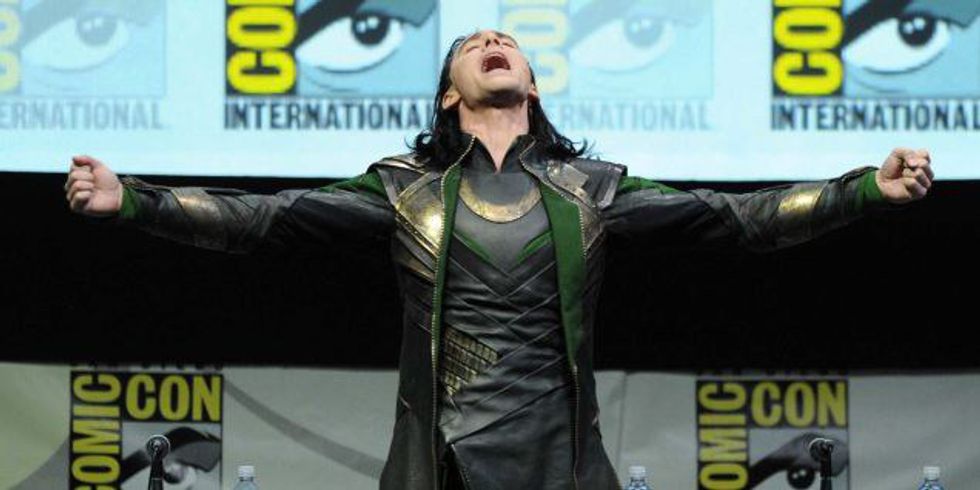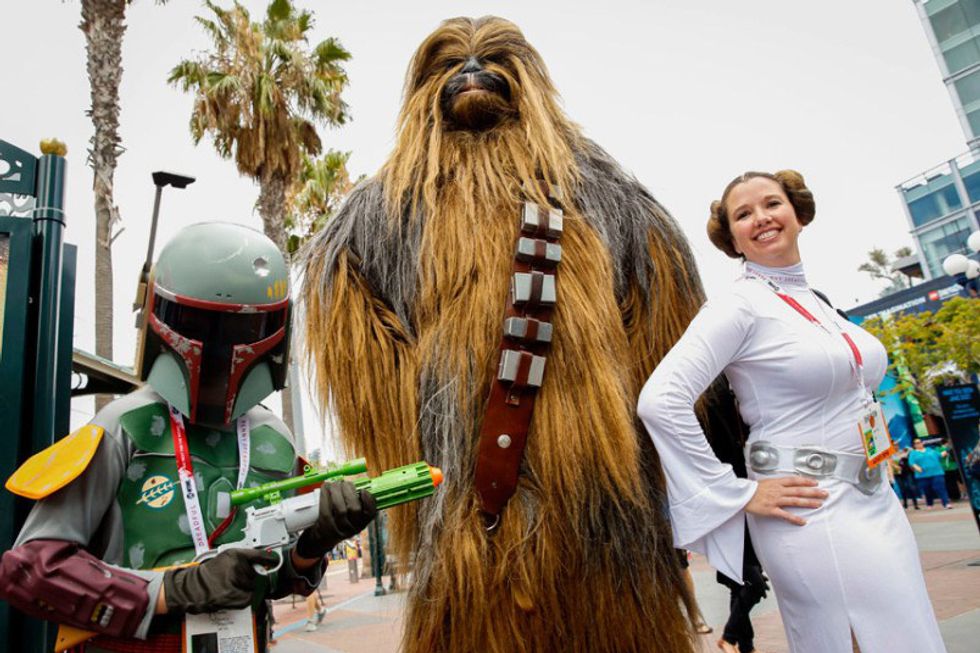For the past couple of years, when July comes around, a piece of my heart breaks. Comic-Con is starting, and where am I? On the other side of the country, with only Google as my aid in finding out what is happening at the largest pop culture convention in the word.
I want to be there so badly. It hurts.
One day I will, but for now, I'm left with my thoughts. What exactly is it about Comic-Con that makes me want to go? Why would I spend a week stuck in a crowded convention center, waiting in lines and being herded and pushed around like cattle? Because at Comic-Con, waiting in lines means meeting people like you. The crowds melt away when you step onto the exhibit floor, and the booths of vendors from all walks of "popular life" await you.
How would I know this? General research, mostly. Remember, I do spend the week of Comic-Con glued to entertainment news sites. But there must be something more. So I did some digging. I went to comic-con.org and found its mission statement. It reads, "Comic-Con International: San Diego is a nonprofit education corporation dedicated to creating awareness of, and appreciation for, comics and related popular artforms, primarily through the presentation of conventions and events that celebrate the historic ongoing contribution of comics to art and culture."
San Diego Comic Con is one part of a larger organization; I never knew that. In fact, I did not know Comic-Con stemmed from a "nonprofit education corporation."
Education. The word jumped out at me. When we think of Comic-Con, usually we think of 130,000 people willing to sacrifice their sanity and hygiene for the love of comics, movies, TV shows, and cosplay. The Princess Laya trend? Definitely a Comic-Con classic. But if you look at the panels offered throughout Comic-Con, there are some fascinating ones, educating attendees on the art of comics, how to use them in the classroom, what transferring a comic book to the silver screen looks like...the list goes on. So sure, there is entertainment involved, but there is also a good amount of education.
My school offers a program called The Experience at Comic-Con, where you travel with one of our communication professors to San Diego and conduct ethnographic research. Then, you present your research in front of an audience of academic scholars. This is all thanks to the Comics Arts Conference. This is the perfect way to experience Comic-Con: educating oneself while having fun.
Unfortunately, not many people are going to Comic-Con to be educated. Many are going to get the limited-edition collector items and to watch the exclusive footage of new movies and TV shows only showed in Hall H. Prior to today, I would have been one of those people. But after reading the mission statement, something has changed. Comics are an art, and Comic-Con International (CCI) is dedicated to preserving them as such. CCI exists first to educate others about this genre of literature we so often toss aside as unprofessional and tacky.
But they aren't. You will find stories of good versus evil in comic books. You will see love, experience heartbreak, grow angry with villains, and cheer for the heroes. The medium is coming back strong, perhaps stronger than ever, but I worry when we think of comics, we think only of comic-book movies or television. Comic-Con is becoming a market for production companies to showcase their new films and shows. The panels I mentioned above about educating attendees are nowhere near as packed as Hall H and Ballroom 20, the two main stages for big budget movies and TV shows.
" [To] celebrate the historic ongoing contribution of comics to art and culture."
These are the final words of the Comic-Con International: San Diego mission statement. What more people should know about Comic-Con is that it is there to educate people on comics and other art forms, to help them appreciate this medium. Can we really appreciate it if we spend all our time at the Warner Brothers booth?
I ask that question more for myself. Last summer, when my friend and I tried to go to Comic-Con, all I could think of was going to the Warner Brothers and Marvel booths and camping out in line for Hall H. But now, I look through the schedule of the different panels, and I see others that catch my eye, like the Comic-Con Film School and the panels about the evolution of geek culture and fanboys. That is fascinating to me, and as an aspiring film maker, those small-room panels are perfect for learning more about my craft--and, as a lover of all things popular culture, what better way to satisfy my hunger for knowledge than with several diverse panels?
I'm not saying Hall H is a heathen place and should be take away from Comic-Con. I am a firm believer that movies are very important in our culture today as they are one of the best mediums for sending positive messages and inspiring others for change. In fact, when I do go to Comic-Con, you will find me in the Hall H line at 6 pm camping out before the Warner Brothers panel. But the other days? I want to spend them truly exploring Comic-Con. If the main goal of this incredible organization is to educate me and to help me appreciate an art form I love, how can I deny myself that opportunity by not digging in to find the obscure panels in the nooks and crannies of the convention center? And like the cosplayers that hide their true identity under their flashy costumes, so Comic-Con's true purpose can be lost in the splendor of the exhibit hall. There is always more beneath the surface, and if we really appreciate something, we will be willing to unlock it's underlying meaning and explore its secrets. Are we willing to go searching for them?



























